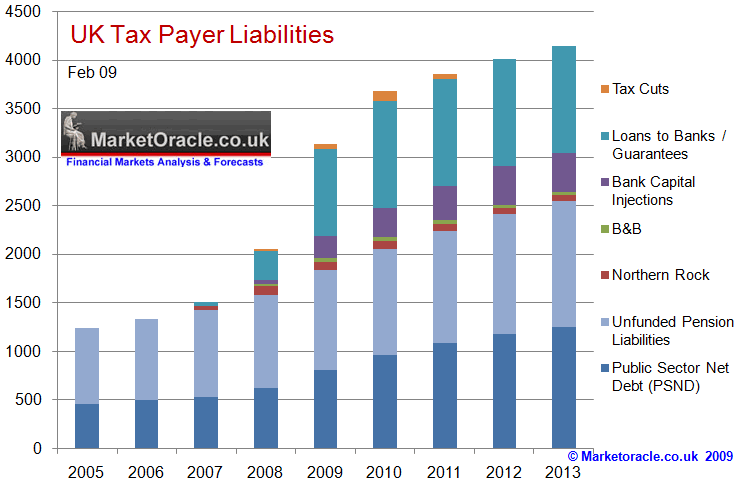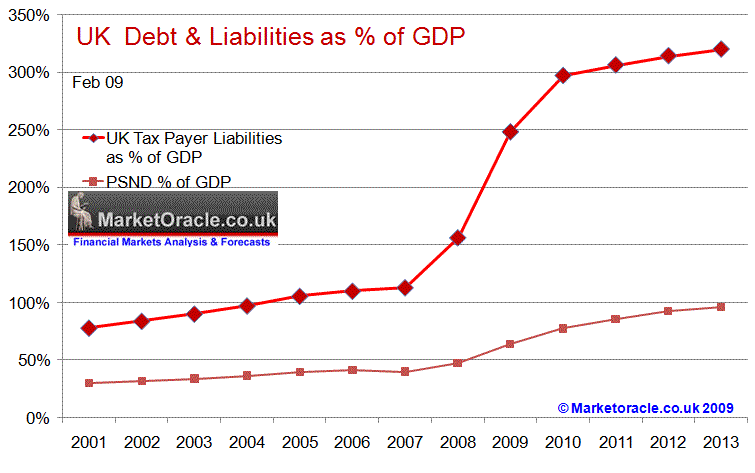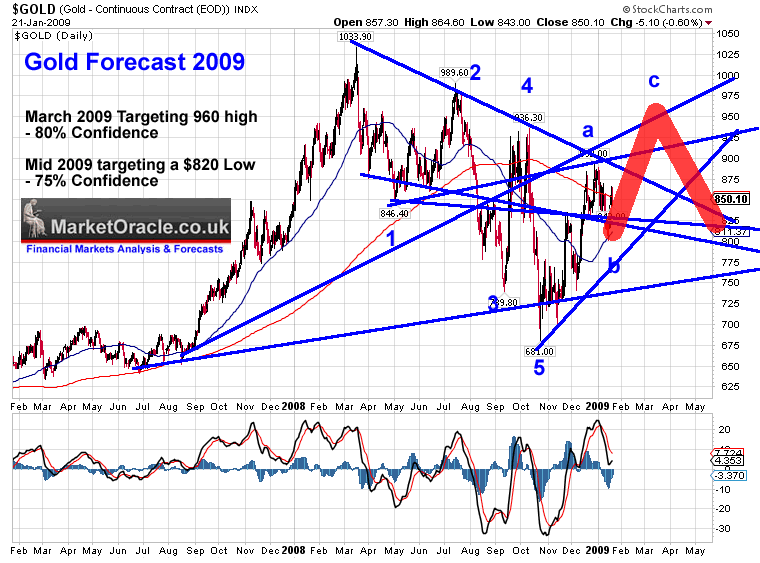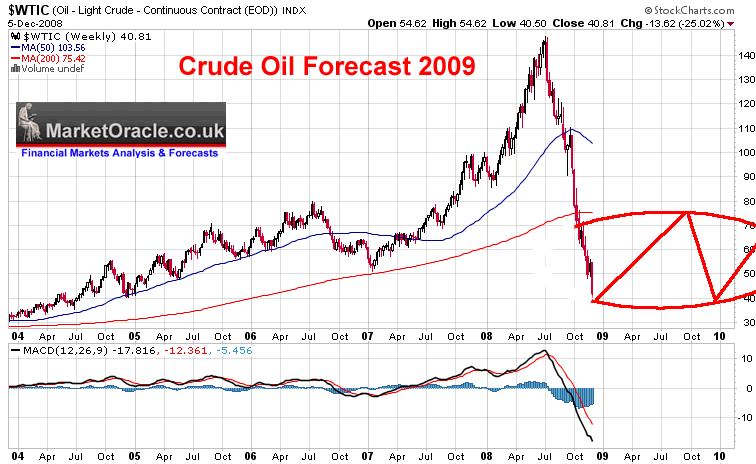Subprime Eastern Europe to Bankrupt Western European Banks
News_Letter / Euro-Zone Mar 08, 2009 - 09:40 AM GMTBy: NewsLetter
 March 4th , 2009 Issue #17 Vol. 3
March 4th , 2009 Issue #17 Vol. 3
The long ticking time bomb of Eastern European debt is starting to explode with an even greater inevitability as that of subprime mortgages exploding in the United States, as at least in the United States the determining factor of whether or not the mortgage market would go bust is the state of the US housing market. With Eastern Europe the big and obvious question mark that has been raised many times long before the housing markets peaked and the stock markets crashed was the degree of borrowing by Eastern Europeans in foreign currencies that set the borrowers up for the ticking currency time bomb when the forex trends reversed against them would send the value of debts soaring in the domestic currencies thus pushing for example the housing borrowers into negative equity WITHOUT A FALL IN HOUSE PRICES.
Subprime Eastern Europe to Bankrupt Western European BanksDear Reader, The long ticking time bomb of Eastern European debt is starting to explode with an even greater inevitability as that of subprime mortgages exploding in the United States, as at least in the United States the determining factor of whether or not the mortgage market would go bust is the state of the US housing market. With Eastern Europe the big and obvious question mark that has been raised many times long before the housing markets peaked and the stock markets crashed was the degree of borrowing by Eastern Europeans in foreign currencies that set the borrowers up for the ticking currency time bomb when the forex trends reversed against them would send the value of debts soaring in the domestic currencies thus pushing for example the housing borrowers into negative equity WITHOUT A FALL IN HOUSE PRICES. This originally implied that the eastern european governments would be forced to raise interest rates much higher than they would like to so as to defend their currencies that weakened against the creditor nations namely the Euro and Japanese Yen so as to reduce the debt burden on borrowers for if they failed to do so then the debt levels would explode to levels that would bankrupt the borrowers both corporate and mortgage borrowers, which would trigger economic contraction and hence worsen the situation as debt default rates soared. However now we have the added problem of the world economy going into a deep economic slump that has resulted in the collapse of global trade and hence Eastern European economies are falling off the edge of a cliff as they are hit from all sides, by currencies collapsing as exports slump and investments being repatriated back to western countries coupled with the frozen credit markets. Latvia the Next Iceland? The situation has reached such a crisis point in Latvia that anyone that reports on the truth is being arrested by the Latvian security forces as an omen that economic turmoil means a return towards tyranny as I wrote of in early December 08 - (Latvia Protects its Banking System by Arresting Economist For Speaking the Truth),as the Latvian secret police arrested Dmitrijs Smirnovs, a university professor for delivering gloomy forecasts on the prospects for the Latvian economy and the state of the Latvian banking system. Since then, Latvia has continued its economic and financial meltdown as evidenced by the 10% slump in GDP as the credit rating agencies cut the countries credit rating to junk level. Latvia following the collapse of the soviet union had sought to burn its bridges with Russia with a view to moving towards the EU, now the EU has shut its door in the face of its own banking sectors toxic liabilities of $23 trillion that threaten a collapse of the Euro, Latvia is left a drift on its own seeking an IMF bailout that itself has gone cap in hand to the EU for more emergency funds. Not far behind Latvia are Lithuania and Estonia, which are all along the same path as Latvia having adopted similar policies of burning their bridges with Russia, which must now be looking on with gleeful satisfaction. Although the collapse in the crude oil price has put a severe strain on its own state budget as much of it was on the expectations that crude oil would stay north of $80 instead of the recent range of $45 to $30. The rest of eastern europe is gearing up for a chain reaction of Iceland-esk collapses, with those topping the list in addition to the 3 already mentioned being Bulgaria, Romania and Hungary in total threatening to default on some $2 trillion of debt to the European banks. EU countries hit hardest by loans to Eastern Europe are Austria, Italy and France as most exposed, for example Austrian banks have loaned as much as 70% of the countries GDP to Eastern Europe. That liability is OFF its public debt level which stands at 60% of GDP therefore real liability is somewhere north of 250% of GDP for Austria allowing for all banking sector liabilities. Western European Iceland's The most at risk of government debt default within the European Union are Spain and Greece which is reflected in the reduced credit ratings of less than triple AAA enroute towards junk bond status, which further increases's the strains within the Euro block and means that these countries are in effect being bailed out by Germany, for if they had been outside of the Euro then their currencies and economies would resemble the stage at which the eastern european countries are at i.e. GDP contraction of 10% or more and currencies in freefall. Implications for the European Union As mentioned earlier, the $2 trillions of eastern european debt added to EU domestic liabilities and exposure to U.S. subprime collatorised debt, brings the Euro zones total toxic debt liabilities to more than $23 trillion, this is set against the U.S. liabilities estimated at $11 trillion, therefore Europe is in a far more dangerous position in terms of the fallout from the credit crisis than the United States. The primary reason for such greater exposure is that the European banks were far trickier than the U.S. banks in terms of off balance sheet leverage i.e. many European banks have leveraged up to as much as X60 capital, against typical wall street bank leverage of X30 capital. This therefore in the immediate future implies greater contraction of the European economies than the U.S. economy as well as suggesting higher inflation and therefore supports the view of a stronger US Dollar against the Euro. Britain's Trend Towards Becoming Iceland The situation with regards Austria is dwarfed by Britain's liabilities that already project to 300% of GDP as the below graphs illustrate as per the recent analysis - Gordon Brown Bankrupting Britain as Tax Payer Liabilities Soar- Update
However the above does not take into account the total nationalisation of the whole UK banking system which would push Britain's liability up towards a currency collapsing 550% of GDP, as total bank liabilities stand at some 400% of GDP i.e. £5 trillion against GDP of £1.2 trillion of which so far Britain is officially exposed to £1.2 trillion. The consequences As Novembers article pointed out ( Bankrupt Britain Trending Towards Hyper-Inflation?) Britain is already on its way towards becoming a big version of Iceland as liabilities continue to soar, the greater the liabilities the greater the probability that the British economy will collapse into debt default and hyperinflation. Gordon Brown has already loaded the UK tax payer to the tune of £1.2 trillion of bankrupt bank liabilities, with the odds strong that this will pass above £2 trillion by the end of 2009. The amount of liabilities are truly staggering and really do risk the bankruptcy of the country, for example the total amount of revenue the government earns from taxation is just £550 billion AND CONTRACTING. Debt EXPLODING, Revenues CONTRACTING = Further sharp falls in the exchange rate towards parity to the US Dollar. What Britain Should be doing ? The government should protect the country FROM the bankrupt banks which SHOULD be ALLOWED to go BANKRUPT. AFTER bankruptcy the government can pick from within the carcasses of the dead banks the profitable arms that can be restructured into viable retail banking institutions all at limited cost and liability to the tax payer instead of the present situation which NATIONALISES the ever multiplying LOSSES whilst PRIVITISING the REWARDS for bankrupting the banks as we most recently observed with Fred Goodwin who after destroying RBS banked a £700,000 per year pension at age 50. Whereas if the bank had been allowed to go bankrupt his pension would be about £21,000 per year. What to do ? Britain is sowing the seeds of future inflation which means higher interest rates and a falling currency that continues to target parity to the U.S. Dollar, the worlds safe haven reserve currency. This therefore continues to support the strategy of accumulating commodities and other inflation sensitive assets as well as distributing a portion of ones 'cash' into the safe haven currency. Also post recession stagflation will ensure that countries such as China will exhibit greater economic growth and hence capital appreciation than most european countries including Britain that will continue to attempt to inflate their way out of the debt mountain. IT IS FAR BETTER FOR THE BANKS TO DEFAULT ON THEIR LIABILITIES THAN FOR THE STATE TO BE FORECED TO DO SO. Quick review of the Financial Markets Gold Quick update ($920)- The trend so far is close to the forecast for 2009 ( Gold Price Forecast 2009 )as illustrated by the original graph below that called for a rally to $960 by early March and a decline to $820 by Mid 2009. Yes gold broke above $960 to above $1000, which on face value is a sign of relative strength. However time wise gold has turned lower a little earlier than originally anticipated this therefore is a sign of weakness, which therefore neutralises the stronger price run and continues to confirm the trend towards the target of $820. However the rate of decline suggests an earlier low probably by late April 09. Chris Vermeulen covers gold in greater depth in his excellent commentary.
Crude Oil Quick Update ($44)- The crude oil forecast for 2009 as of 8th Dec 08, that concluded with that crude oil would remain depressed for the whole of 2009 which will seek to generate an overall saucer shape bottom as illustrated below, however the analysis had anticipated at least 2 spikes higher that could see crude oil leap towards $80 before reversing back towards the lows for the year. The technical picture being painted by crude oil now suggests that crude oil may be gearing up towards one of these spikes higher.
Stock Markets (6740)- My technical view for the stocks bear market is that it continues to target a trend towards 6000 by July 2009 as of 25th Feb, which updated the forecast of 20th Jan. The current phase of the forecast implies that the DJIA should rally into early April targeting 7800. By Nadeem Walayat Copyright © 2005-09 Marketoracle.co.uk (Market Oracle Ltd). All rights reserved. Nadeem Walayat has over 20 years experience of trading derivatives, portfolio management and analysing the financial markets, including one of few who both anticipated and Beat the 1987 Crash. Nadeem's forward looking analysis specialises on the housing market and interest rates. Nadeem is the Editor of The Market Oracle, a FREE Daily Financial Markets Analysis & Forecasting online publication. We present in-depth analysis from over 250 experienced analysts on a range of views of the probable direction of the financial markets. Thus enabling our readers to arrive at an informed opinion on future market direction. http://www.marketoracle.co.uk Disclaimer: The above is a matter of opinion provided for general information purposes only and is not intended as investment advice. Information and analysis above are derived from sources and utilising methods believed to be reliable, but we cannot accept responsibility for any trading losses you may incur as a result of this analysis. Individuals should consult with their personal financial advisors before engaging in any trading activities. Attention Editors and Publishers! - You have permission to republish THIS article. Republished articles must include attribution to the author and links back to the http://www.marketoracle.co.uk . Please send an email to republish@marketoracle.co.uk, to include a link to the published article.
You're receiving this Email because you've registered with our website. How to Subscribe Click here to register and get our FREE Newsletter Forward a Message to Someone [FORWARD] To update your preferences and access the Newsletter archive [PREFERENCES] How to Unsubscribe - [UNSUBSCRIBE]
|
|||||||||||||
© 2005-2022 http://www.MarketOracle.co.uk - The Market Oracle is a FREE Daily Financial Markets Analysis & Forecasting online publication.






